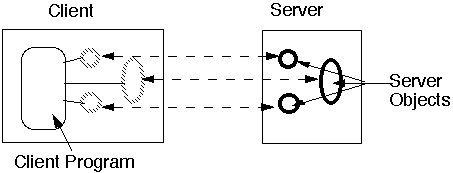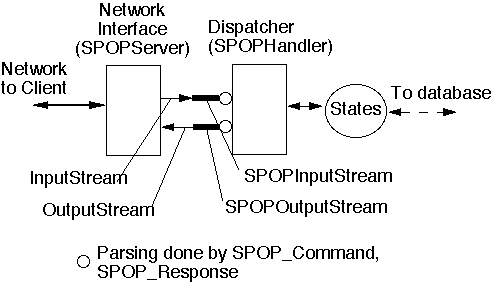 CS 596 Client-Server Programming
CS 596 Client-Server Programming
Corba, Patterns, and Stuff
[To Lecture Notes Index]
San Diego State University -- This page last updated May 14, 1996

Contents of Corba, Patterns, and Stuff Lecture
- CORBA
- OpenDoc
- Tools
- What about C/C++ and Client-Server?
Common
Object Request Broker Architecture
- "CORBA allows applications to communicate with one another no matter where
they are located or who has designed them"
 Java Corba "like" Implementations
Java Corba "like" Implementations
Black Widow http://www.pomoco.com/
Sun (JOE and RMI) http://splash.javasoft.com/pages/intro.html
HORB http://www.isg.de/OEW/Java/
Object Management Group (OMG)
Responsible for CORBA standard
http://www.omg.org/
Very Simple Bank Example
From Black Widow Web Pageshttp://www.pomoco.com/
Bank
- Contains balance which can be accessed
AccountManager
- Used to provide access to bank account
Step 1 - IDL for classes
IDL = interface definition language
module Bank {
interface Account {
float balance();
};
interface AccountManager {
Account open(in string name);
};
};
Step 2
IDL to java compiler produces some java classes needed for CORBA
interface Bank.Account extends interface CORBA.Object
interface Bank.AccountManager extends interface CORBA.Object
class Bank._sk_Account implements interface Bank.Account
class Bank._sk_AccountManager implements interface
Bank.AccountManager
class Bank.Account_var
class Bank.AccountManager_var
Step 3 - Write Server CodeJava Server-Side Code
import java.util.*;
class Account extends Bank._sk_Account {
private float _balance;
Account(float balance) {
_balance = balance;
}
public float balance() throws CORBA.SystemException {
return _balance;
}
}
More Server Code
class AccountManager extends Bank._sk_AccountManager {
private Dictionary _accounts = new Hashtable();
private Random _random = new Random();
AccountManager(String name) {
super(name);
}
public Bank.Account open(String name) throws
CORBA.SystemException {
// Lookup the account in the account dictionary.
Bank.Account account = ( Bank.Account ) _accounts.get( name );
if(account == null) {
// Create a new account with between 0 and 1000 dollars.
float balance = Math.abs(_random.nextInt()) % 100000 / 100f;
account = new Account(balance);
System.out.println("Created " + name + "'s account: " + account);
// Export the new object reference.
CORBA.ORB.init().BOA_init().obj_is_ready(account);
// Save the account in the account dictionary.
_accounts.put(name, account);
}
// Return the account.
return account;
}
}
The Server
public class Server {
public static void main(String[] args) {
try {
// Initialize some CORBA Stuff
CORBA.ORB orb = CORBA.ORB.init();
CORBA.BOA boa = orb.BOA_init();
// Create the account manager object.
AccountManager manager =
new AccountManager("Post-Modern Bank");
// Export the newly create object.
boa.obj_is_ready(manager);
System.out.println(manager + " is ready.");
// Wait for incoming requests
boa.impl_is_ready();
}
catch(CORBA.SystemException e) {
System.err.println(e);
}
}
}
Step 4 - Write the Client
public class Client {
public static void main(String args[]) {
try {
// Initialize the ORB.
CORBA.ORB orb = CORBA.ORB.init();
// Locate an account manager.
Bank.AccountManager manager =
Bank.AccountManager_var.bind("Post-Modern Bank");
// use args[0] as the account name, or a default.
String name = args.length > 0 ? args[0] : "Jack B. Quick";
// Request the account manager to open a named account.
Bank.Account account = manager.open(name);
// Get the balance of the account.
float balance = account.balance();
// Print out the balance.
System.out.println
("The balance in " + name + "'s account is $" + balance);
}
catch(CORBA.SystemException e) {
System.err.println(e);
}
}
}
Step 5 Run Server and Client
prompt> java Client
The balance in Jack B. Quick's account is $71.62
prompt> java Client
The balance in Jack B. Quick's account is $71.62
prompt> java Client "Jack Sprat"
The balance in Jack Sprat's account is $322.38
prompt> java Client "Jack Sprat"
The balance in Jack Sprat's account is $322.38
prompt> java Client
The balance in Jack B. Quick's account is $71.62
The end of applications?
 Patterns in Client-Server
Patterns in Client-Server
From New Clients with Old Servers: A Pattern Language for Client/Server
Frameworks by Wolf and Liu in Pattern Languages of Program Design
ed. by Coplien, Schmidt 1995, Addison-Welsey
Exception
- Built-in to Java
Singleton
- How to insure just one instance of a class
Objects From Records
- Translate between flat relational rows of database to objects
Request
- Request object encapsulates network interface: TCP/IP, remote procedure
calls, etc.
Materialization
- Move objects between server and client
Finalization
- Need to some action when object dies
Identity Management
- Program is likely to materialize multiple copes of same object
Mega-Scrolling (virtual lists)
- List of items which is too large to transport to client at one time
Dependency ( Model-View, Observer )
- Keep interface code (view) separate from rest of program (Model)
Factory
- How to create a Client handler in Server class without changing the server
class
-
- How to create interface and keep interface information from model
Window-Keeping
- Complex windows can take too long to create
- Cache windows and reuse them
Client/Server Framework
See
previous two slides


 CS 596 Client-Server Programming
CS 596 Client-Server Programming CS 596 Client-Server Programming
CS 596 Client-Server Programming